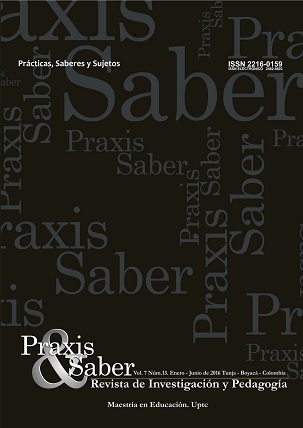Technological mediation: new scenarios for teaching practice

Abstract
The objective of this article is to elucidate and reflect on the dimensions configured in a transformation of teaching practices. Such practices can lead to set new educational scenarios based on technological mediation. This paper is the result of a qualitative analysis of concepts referred to in researches between 2009 and 2013. Likewise it makes part of the project: ‘Theoretical Approaches of Research Projects on Mediation of Information and Communication Technologies: A Configuration for a Conceptual Approach’, product of the announcement # 9 by Universidad Santo Tomas’ Distance Learning – Open University Vice Chancellor Office (VUAD). It is inquired, among other emerging categories, about autonomous and collaborative learning, the role of online tutors, the social, teaching, and cognitive presence, the collective intelligence and the digital education. Methodologically dissertation was based on the use of ATLAS.ti – program that strengthened the process of ordering and organizing the information from various sources, and helped to determine the categorization and construction of semantic maps. Finally, conclusions and questions about prospects for technology and education are presente.Keywords
mediation, teaching practice, information technologies.
References
- Battro, A. & Denham P. (1997). La educación digital [versión digital]. Buenos Aires: Editorial Emecé.
- Chevallard, Y. (1997). La transposición didáctica. Buenos Aires: Editorial Aique.
- Díaz, E. (2005). Postmodernidad [3ª ed.] Buenos Aires: Editorial Biblos.
- Facundo-Díaz, A. H. (2005). Tecnologías de información y comunicación y educación superior virtual en Latinoamérica y el Caribe: evolución, características y perspectivas. Bogotá: Universidad Los Libertadores.
- Fainholc, B. (2001). 'La tecnología educativa apropiada: una revisita a su campo a comienzos de siglo'. Revista RUEDA [4]. Universidad Nacional de Luján.
- Franco-Naranjo, I. (2011). Interacción y aprendizaje colaborativo en el curso virtual de lingüística de la UNAD [Tesis de Maestría]. Bogotá: Universidad Santo Tomás.
- Galindo, J.A. (2011). 'Brechas didácticas y brechas digitales, retos para la formación docente'. Revista actualidades pedagógicas [58]. Universidad de La Salle - Facultad de Ciencias de la Educación.
- GALVIS-PANQUEVA, A. (2008). 'La PIOLA y el desarrollo profesional docente con apoyo de Tecnologías de Información'. Tecnología y comunicación educativas [46 (22) 58-86].
- GARCÍA-CABRERO, B.; MÁRQUEZ-RAMÍREZ, L.; BUSTOS-SÁNCHEZ, A.; MIRANDA-DÍAZ, G. A. & ESPÍNDOLA, S. M. (2008). 'Análisis de los patrones de interacción y construcción del conocimiento en ambientes de aprendizaje en línea: una estrategia metodológica'. Revista electrónica de investigación educativa [10 (1)].
- Garrison, D. & Anderson, T. (2005). El e-learning en el siglo XXI. Investigación y práctica [Trad. A. Fuentes]. Barcelona: Octaedro.
- Garrison, D. & Cleveland-Innes, M. (2005). 'Facilitación de la interacción cognitiva presencia en línea de aprendizaje: no es suficiente'. American Journal of Distance Education [19 (3) 133-148].
- Gros-Salvat, B. (2007). 'El aprendizaje colaborativo a través de la Red'. Dialnet [162, 44-50].
- Gros-Salvat, B. (2008). Aprendizajes, conexiones y artefactos: la producción colaborativa de conocimiento. Barcelona: Gedisa.
- GUNAWARDENA, CH.; LOWE, C. & ANDERSON, T. (1997). 'Analysis of global online debate and the development of fan interaction analysis model for examiniting social construction of knowledge in computer conferencing'. Journal of Educational Computer Research [17 (4) 395-429].
- https://doi.org/10.2190/7MQV-X9UJ-C7Q3-NRAG
- Gutiérrez-Pérez, F. & Prieto-Castillo, D. (1999). La mediación pedagógica. Apuntes para una educación a distancia alternativa [6ª ed.] Buenos Aires: Ciccus - La Crujía.
- LEVY, P. (2004). Inteligencia colectiva [versión digital]. Washington: Organización Panamericana de la Salud. Recuperado el 3 de febrero de 2014 de http://inteligenciacolectiva.bvsalud.org
- MARÍN-MURILLO, F. & ARMENTIA-VIZUETE, J. I. (2009). 'Los estudiantes frente al reto de las TIC en la universidad. Moodle y eKasi en la Facultad de Ciencias Sociales y de la Comunicación (Universidad del País Vasco)' [R. d. Vasco, ed.] Revista de estudios de comunicación (zer) [14 (27) 319-347].
- Martín-Barbero, J.; Sunkel, G.; Bello, M. N.; Pacari-Vega, N. & Valenzuela-Arce, J. M. (2005). América Latina, otras visiones de cultura. Convenio Andrés Bello [166]
Downloads
Download data is not yet available.